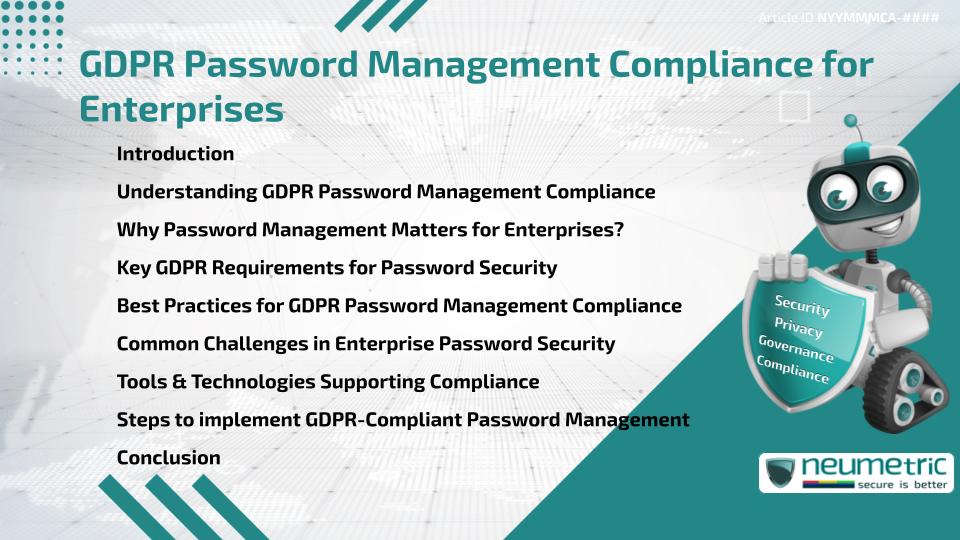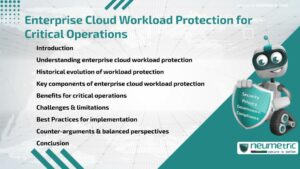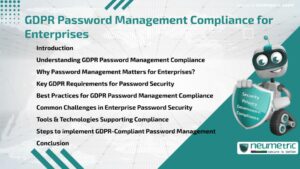Table of Contents
ToggleIntroduction
Passwords remain one of the most widely used authentication methods for enterprise systems. However, under the General Data Protection Regulation (GDPR), poor password practices can expose Organisations to compliance Risks, data breaches & costly penalties. Achieving GDPR password management compliance is therefore essential for protecting Personal Data & demonstrating accountability.
This article explores GDPR requirements for password security, Best Practices for enterprises & strategies to ensure compliance.
Understanding GDPR Password Management Compliance
GDPR emphasizes safeguarding Personal Data against unauthorised access. While it does not prescribe specific password Policies, it requires Organisations to implement “appropriate technical & organizational measures” to secure data.
In practice, this means enterprises must adopt strong password Policies, secure storage mechanisms & Continuous Monitoring to comply with GDPR obligations.
Why Password Management Matters for Enterprises?
Weak or mismanaged passwords are among the most common causes of data breaches. For enterprises handling large volumes of Sensitive Data, the consequences of non-compliance include:
- Financial penalties: Fines under GDPR can reach up to €20 million or 4% of annual global turnover.
- Reputational damage: A breach caused by weak password practices can erode Customer Trust.
- Operational disruption: Compromised systems may halt business processes.
Effective password management mitigates these Risks while aligning with GDPR security expectations.
Key GDPR Requirements for Password Security
Enterprises should align password Policies with the following GDPR Compliance considerations:
- Encryption & Hashing: Passwords must never be stored in plain text. Secure hashing algorithms (e.g., bcrypt, Argon2) should be used.
- Access Control: Ensure that only authorized personnel can access systems handling Personal Data.
- Data Minimisation: Limit password access to only what is necessary for Business Operations.
- Accountability: Maintain Audit logs to track login attempts & password changes.
- Regular Updates: Encourage or enforce periodic password changes to reduce Risks.
Best Practices for GDPR Password Management Compliance
To strengthen password security & meet GDPR standards, enterprises should:
- Use Multi-Factor Authentication (MFA) to reduce reliance on passwords alone.
- Adopt strong password Policies requiring complexity, minimum length & uniqueness.
- Implement password managers for secure storage & sharing of enterprise credentials.
- Enforce least privilege access to ensure Employees only access what they need.
- Conduct regular training to make Employees aware of phishing & password hygiene.
- Perform routine audits to detect weak or reused passwords.
Common Challenges in Enterprise Password Security
Enterprises often face obstacles when trying to achieve GDPR password management compliance, including:
- Resistance from Employees to adopt stricter Policies.
- Shadow IT & use of unsanctioned password storage methods.
- Difficulty managing credentials across hybrid & multi-cloud environments.
- Balancing usability with stringent security requirements.
Overcoming these challenges requires clear Policies, automation & strong leadership commitment.
Tools & Technologies Supporting Compliance
Enterprises can leverage modern solutions to simplify password compliance:
- Enterprise password managers like LastPass, 1Password Business or Dashlane.
- Identity & access management (IAM) solutions such as Okta or Microsoft Entra ID.
- Privileged access management (PAM) tools for controlling admin-level credentials.
- Automated Monitoring Tools to detect & respond to suspicious login activity.
Steps to implement GDPR-Compliant Password Management
- Assess current password practices & identify compliance gaps.
- Develop enterprise-wide password Policies aligned with GDPR standards.
- Deploy secure password management tools for centralized control.
- Train Employees to adopt & maintain secure password practices.
- Monitor & Audit systems to ensure continuous compliance.
- Update Policies regularly to address evolving Threats & regulatory changes.
Conclusion
GDPR does not dictate exact password rules but requires enterprises to ensure robust safeguards against unauthorized access. By adopting GDPR password management compliance practices-such as MFA, encryption & centralized password controls-enterprises can enhance Data Protection, reduce breach Risks & maintain Regulatory Compliance.
Takeaways
- GDPR requires enterprises to implement strong password protection as part of Data Security Measures.
- Poor password management can result in breaches, fines & reputational damage.
- MFA, IAM tools & password managers are key enablers of compliance.
- Continuous Training & monitoring help maintain long-term compliance.
FAQs
What is GDPR password management compliance?
It refers to the implementation of password Policies & tools that align with GDPR requirements for protecting Personal Data.
Does GDPR mandate specific password requirements?
No, GDPR does not specify exact rules but requires enterprises to adopt appropriate Security Measures.
How can enterprises ensure compliance with GDPR password rules?
By using encryption, MFA, secure password managers & enforcing strong Policies across all systems.
What are the Risks of non-compliance with GDPR password standards?
Organisations may face regulatory fines, data breaches, loss of trust & business disruptions.
Are password managers GDPR compliant?
Yes, enterprise-grade password managers are designed with encryption & Access Control features that support GDPR Compliance.
Need help for Security, Privacy, Governance & VAPT?
Neumetric provides organisations the necessary help to achieve their Cybersecurity, Compliance, Governance, Privacy, Certifications & Pentesting needs.
Organisations & Businesses, specifically those which provide SaaS & AI Solutions in the Fintech, BFSI & other regulated sectors, usually need a Cybersecurity Partner for meeting & maintaining the ongoing Security & Privacy needs & requirements of their Enterprise Clients & Privacy conscious Customers.
SOC 2, ISO 27001, ISO 42001, NIST, HIPAA, HECVAT, EU GDPR are some of the Frameworks that are served by Fusion – a SaaS, multimodular, multitenant, centralised, automated, Cybersecurity & Compliance Management system.
Neumetric also provides Expert Services for technical security which covers VAPT for Web Applications, APIs, iOS & Android Mobile Apps, Security Testing for AWS & other Cloud Environments & Cloud Infrastructure & other similar scopes.
Reach out to us by Email or filling out the Contact Form…





